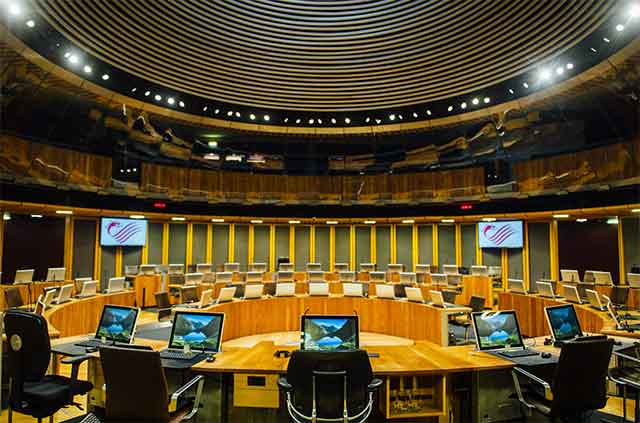A Senedd committee has written to Natural Resources Wales after thousands of people and almost 100 organisations criticised plans to close three visitor centres.
More than 13,200 people have signed a petition against NRW’s proposal to close the Bwlch Nant yr Arian, Coed y Brenin and Ynyslas centres which attract 750,000 visitors a year.
In his petition, Gareth Jones warned closure of the visitor centres – near Aberystwyth and Dolgellau – would have a far-reaching negative impact on the economy and environment.
The petitioner said closure would also run contrary to the Wales’ Future Generations Act which aims to improve well-being through longer-term thinking.
Now, with a final decision thought to be imminent, the petitions committee has penned a letter to Clare Pillman, NRW’s chief executive, as well as the Senedd’s climate committee.
‘Regressive’
Gareth Price, who is clerk of the petitions committee, said members will be seeking a debate in the Senedd chamber on the issue regardless of the outcome.
He wrote: “Given the urgency of the situation, the committee is writing to share the concerns of the petitioners and other interested parties in advance of NRW making its decision.”
Nearly 100 groups, including Cycling UK, Beicio Cymru and Disability Sport Wales, signed a letter to Huw Irranca-Davies, Wales’ climate change secretary and deputy first minister.
The mountain bike community described NRW’s proposals as a regressive step that threatens to undermine an important part of the Welsh economy.
“Whilst we appreciate the financial challenges,” they wrote. “Decisions on NRW’s finances have to be considered in light of their impact on the wider economy.
“Whilst NRW’s operating loss for a site like Coed y Brenin might be £325,000 per year, the local economy is likely to lose far more if the services at the site are impacted.”
‘Critical’
A separate petition, submitted by Kim Williams and signed by nearly 2,500 people, focused on the plans to close the visitor centre at Ynyslas national nature reserve.
Ms Williams wrote: “NRW is the organisation that should be protecting our wildlife and communities, not destroying them.”
She said the centre at Ynyslas is critical in managing 400,000 visitors a year, with the presence of NRW staff deterring antisocial behaviour such as fires and flytipping.
Ms Williams’ petition added: “The centre provides information and education to all visitors so they understand why the place is special and what impacts their actions have on it.
“It is also a place of social contact for the local community and is a place where nature is accessible to those with limited mobility.
“Effective visitor management at Ynyslas is essential for the protection of the nature reserve and its wildlife.”
‘Stunning’
The petitions committee met to discuss the issue on Monday September 16, with NRW’s next board meeting scheduled for September 25.
Tory MS Peter Fox shared petitioners’ concerns as he backed holding a Senedd debate and advocated writing to NRW as a matter of urgency.
Plaid Cymru’s Luke Fletcher was similarly alarmed.
“What a signal to send – Wales is closed …,” he said. “In the particular case of Coed y Brenin, it’s got recognition globally as one of the best places to do mountain biking.”
Rhys ab Owen, an independent, described Coed y Brenin – which is home to Britain’s first purpose-built mountain biking centre – as a stunning location.
He recalled meeting a group from the Manchester area who later visited the nearby birthplace of Hedd Wyn, the Welsh-language poet.
Mr ab Owen said: “It’s great. It attracts people then they taste a bit of Welsh culture. If Coed y Brenin wasn’t there … they wouldn’t have gone and learned about Hedd Wyn.”
‘Challenges’
NRW has not held a public consultation on the proposed site closures. Over the summer, the body announced plans to plug a £13m budget gap by April 2025 with the loss of 265 posts.
In a note to staff, Clare Pillman, who was appointed chief executive in 2018, said: “The financial challenges we face are not of our own making, nor are they unique to us.
“In recent years our core grant in aid from Welsh Government has not increased, whilst our costs have risen in line with the high levels of inflation we have seen across the economy.”
NRW, which is overseen at arm’s length by ministers, was formed in 2013 from a merger of Wales’ Countryside Council, Environment Agency and Forestry Commission.
In July, Y Byd ar Bedwar, S4C’s current affairs programme, spoke to two whistleblowers who warned of inaction and an “insane level of bureaucracy” at NRW.

